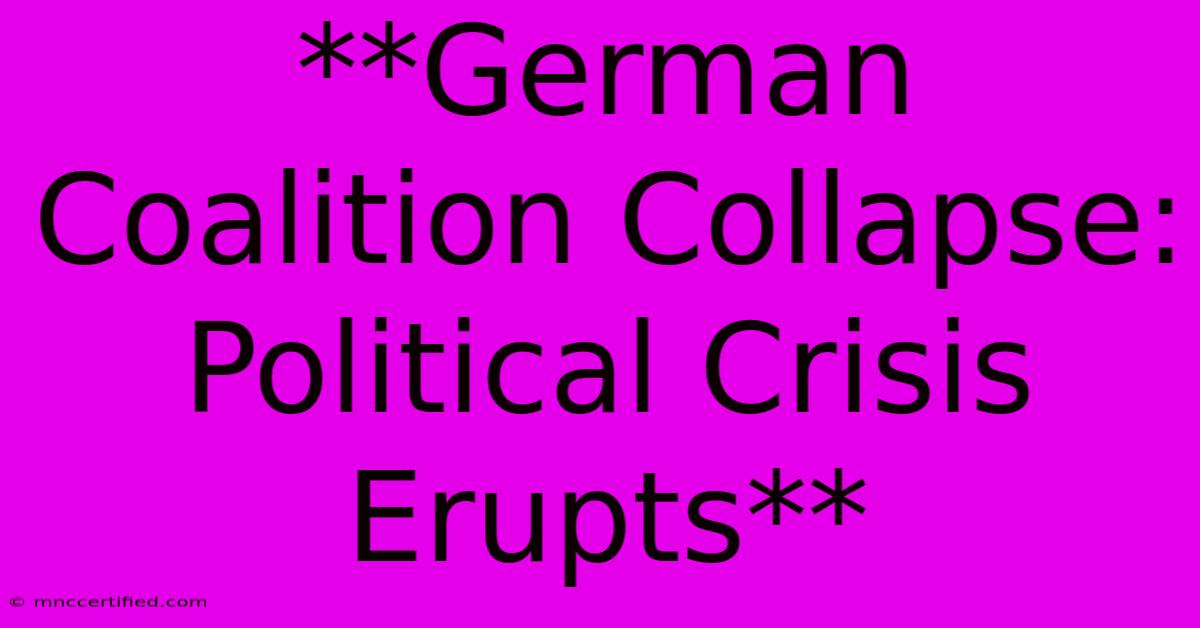**German Coalition Collapse: Political Crisis Erupts**

Table of Contents
German Coalition Collapse: Political Crisis Erupts
Germany faces a political earthquake as the governing coalition teeters on the brink of collapse. The unexpected and dramatic turn of events has sent shockwaves through the nation and beyond, raising concerns about the future of German politics and its impact on the European landscape.
The Spark: A Controversial Housing Bill
The immediate trigger for the crisis was a proposed housing bill, aimed at addressing the country's growing affordability crisis. The bill, championed by the Green Party, included ambitious measures like rent caps and expropriation powers for local governments.
However, this ambitious legislation faced stiff resistance from the Free Democratic Party (FDP), the coalition partner responsible for finance. The FDP, deeply committed to free market principles, viewed the bill as an excessive intervention in the housing market and a threat to property rights.
Deep Divisions Within the Coalition
The housing bill became a lightning rod for deeper ideological and political divisions within the governing coalition. The three parties, the Social Democratic Party (SPD), the Green Party, and the FDP, have been struggling to find common ground on a range of issues, including climate policy, economic development, and foreign affairs.
Growing Public Dissatisfaction
Beyond the coalition's internal struggles, the crisis reflects a growing dissatisfaction among the German public. The country is grappling with a range of challenges, including inflation, energy costs, and the war in Ukraine.
Potential Scenarios: New Elections or a New Coalition?
The current situation leaves Germany with several uncertain scenarios.
- New Elections: The most drastic outcome would be new federal elections. This option, while not unheard of, would be a significant disruption to the political landscape.
- New Coalition: Alternatively, the parties could attempt to forge a new coalition agreement, potentially by bringing in a fourth partner or by shifting the balance of power within the existing coalition.
International Implications
The crisis in Germany has significant international implications, particularly for the European Union. As a leading member state, Germany's political stability and economic strength are crucial for the EU's overall stability and future.
Looking Ahead: Uncertainty and Questions
The coming days and weeks will be crucial for Germany's political future. Key questions remain:
- Can the current coalition survive the crisis?
- What will be the long-term impact on German politics?
- How will the crisis affect Germany's role within the European Union?
The German political crisis serves as a stark reminder of the challenges facing democracies worldwide. The ability to navigate political divisions and find solutions to complex problems is crucial for maintaining stability and fostering long-term prosperity.

Thank you for visiting our website wich cover about **German Coalition Collapse: Political Crisis Erupts**. We hope the information provided has been useful to you. Feel free to contact us if you have any questions or need further assistance. See you next time and dont miss to bookmark.
Featured Posts
-
Xyz Insurance Offers An Annuity With 5 9
Nov 08, 2024
-
Crypto Loko No Deposit Bonus Codes 2024
Nov 08, 2024
-
Does A Fireplace Increase Home Insurance
Nov 08, 2024
-
Wisdom Teeth Covered By Dental Insurance
Nov 08, 2024
-
Galatasaray Vs Tottenham Live Watch Now 11 6 24
Nov 08, 2024